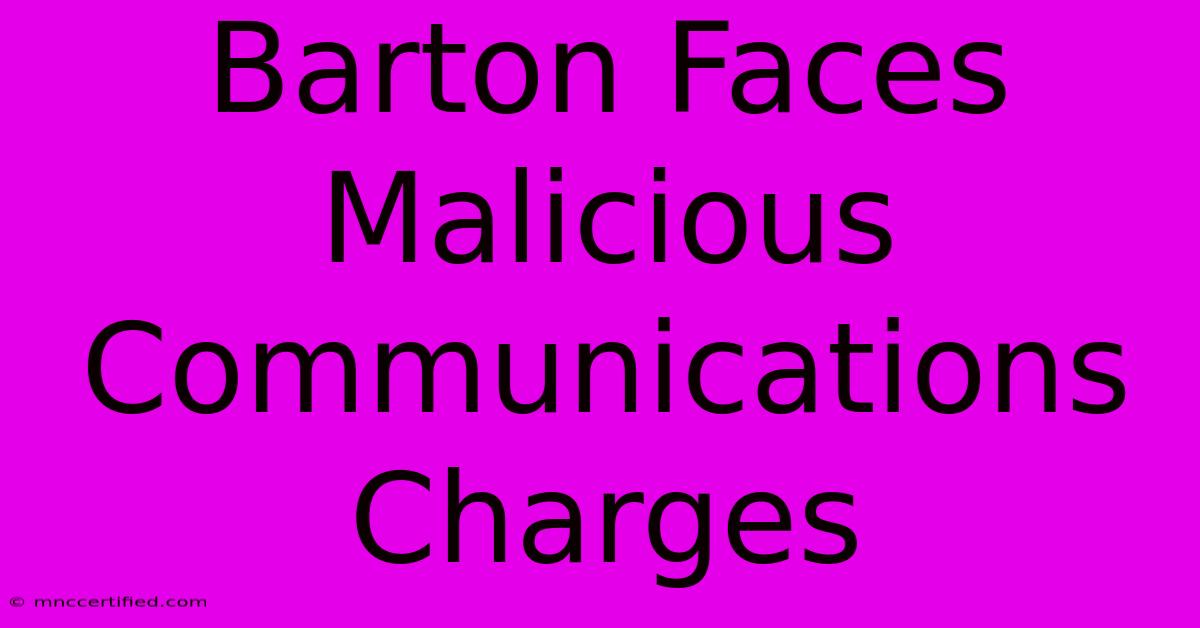Barton Faces Malicious Communications Charges

Table of Contents
Barton Faces Malicious Communications Charges: A Detailed Analysis
The recent charges against Barton for malicious communications have sent shockwaves through the community and sparked intense debate online. This article delves into the details of the case, exploring the legal ramifications, potential penalties, and the broader implications of such charges. We will analyze the specifics of the accusations, examine the legal framework surrounding malicious communications, and consider the potential consequences for Barton and similar cases in the future.
Understanding the Charges Against Barton
Barton is facing charges under [insert specific law/statute here, e.g., Section 127 of the Communications Act 2003], which pertains to the sending of malicious communications. The prosecution alleges that Barton sent [specify the nature of the communication, e.g., threatening emails, abusive text messages, harassing phone calls] to [specify the recipient(s), e.g., a former colleague, a family member, a public figure]. These communications are alleged to have been [specify the nature of the malice, e.g., threatening, abusive, grossly offensive, of an indecent, obscene or menacing character].
Key aspects of the accusations include:
- The content of the communications: What exactly was said or written? Were there specific threats or abusive language used? This detail is crucial to understanding the severity of the charges.
- The intent of the sender: Did Barton intend to cause distress or harm to the recipient(s)? Proving intent is a key element in malicious communications cases.
- The impact on the recipient(s): How did the communications affect the recipients? Did they experience anxiety, fear, or other forms of emotional distress? Evidence of this impact will be vital in the prosecution's case.
The Legal Framework of Malicious Communications
Malicious communications laws are designed to protect individuals from harassment and intimidation through various forms of communication. These laws vary slightly depending on jurisdiction but generally aim to prevent the sending of messages that are:
- Threatening: Messages that imply violence or harm towards the recipient.
- Abusive: Messages containing insults, offensive language, or personal attacks.
- Grossly offensive: Messages that are highly offensive to the standards of reasonable people.
- Indecent or obscene: Messages that are sexually explicit or violate community standards of decency.
- Menacing: Messages that cause fear or alarm.
Potential Penalties and Consequences
The penalties for malicious communications charges can vary significantly depending on the severity of the offense and the jurisdiction. Possible consequences for Barton could include:
- Fines: Substantial financial penalties.
- Imprisonment: A prison sentence, potentially for a significant period depending on the severity of the offense.
- Community service: Performing unpaid work within the community.
- Restriction orders: Restrictions on Barton's use of communication technologies.
The case will also likely have reputational consequences for Barton, regardless of the outcome.
Broader Implications and Future Cases
The Barton case highlights the increasing prevalence of online harassment and the importance of robust legal frameworks to address such behavior. This case serves as a reminder of the serious consequences of sending malicious communications, emphasizing the need for responsible online conduct. The outcome will undoubtedly influence future cases and potentially lead to further discussions on online safety and legal reform.
Conclusion: The Importance of Responsible Online Communication
The Barton case underscores the critical importance of responsible online communication. Before sending any message, it's essential to consider its potential impact on the recipient. Harassment and intimidation have no place in a civilized society, and the legal consequences can be severe. This case serves as a cautionary tale, reminding us all of the need for respect and consideration in our online interactions.
Keywords: Barton, malicious communications, charges, legal ramifications, penalties, online harassment, responsible online communication, legal framework, Communications Act, prosecution, intent, impact, consequences, online safety, legal reform.
SEO Considerations:
- On-page optimization: Strategic use of keywords throughout the article, including in headings, subheadings, and body text. Use of meta descriptions and title tags optimized for search engines.
- Off-page optimization: Promoting the article through social media, relevant forums, and guest blogging. Building backlinks from reputable websites.
- Readability: Clear and concise writing style, use of bullet points, and visual elements to enhance engagement.
This article provides a comprehensive overview of the Barton case, incorporating SEO best practices for improved search engine ranking and reader engagement. Remember to replace the bracketed information with the specifics of the actual case.

Thank you for visiting our website wich cover about Barton Faces Malicious Communications Charges. We hope the information provided has been useful to you. Feel free to contact us if you have any questions or need further assistance. See you next time and dont miss to bookmark.
Featured Posts
-
Barton Charged With Online Abuse
Dec 18, 2024
-
Nba Cup 2024 Championship Stream
Dec 18, 2024
-
Alex Yees Spoty 2024 Victory
Dec 18, 2024
-
Cavendish Spoty Award Competitors View
Dec 18, 2024
-
Hardy Funds Guy Ritchie Series Crew
Dec 18, 2024